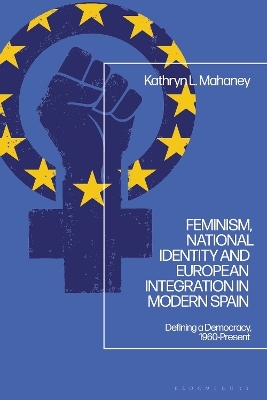
Feminism, National Identity and European Integration in Modern Spain
Defining a Democracy, 1960-Present
Seiten
2024
Bloomsbury Academic (Verlag)
978-1-350-19510-3 (ISBN)
Bloomsbury Academic (Verlag)
978-1-350-19510-3 (ISBN)
This book explores the evolution of Spanish feminism in the context of European feminisms and institutions from the 1960s to recent times.
Beginning with Sección Femenina, the official Francoist women’s organization, Feminism, National Identity and European Integration in Modern Spain traces the interplay between Spanish women’s policy and international policymaking. In some cases, as with the Sección Femenina-championed Law of Political Rights (Ley de Derechos) in 1961, Spanish women’s policy at least appeared more progressive than what Western democracies offered – notable at a time when Spain was considered backward. After Franco’s death in 1975, Spain’s democratic transition seemingly consolidated forward-thinking women’s policy with a Constitution that guaranteed equality of the sexes in 1978, and with the creation of a national bureau charged with crafting women’s policy, the Instituto de la Mujer (Women’s Institute), in 1983.
Yet feminists found themselves marginalized in Spanish political decision-making, as Kathryn L. Mahaney argues so successfully in this study. Mahaney reveals that women ultimately influenced domestic policy not by acting within national networks but by leveraging European connections, particularly after Spain joined the European Economic Community (EEC) in 1986. The book shows that Spanish feminists worked through the EEC to gain international approval of policies that had met domestic opposition, and did so by representing them as necessary litmus tests of nations’ democratic integrity. Their proposals were shaped by the specific context of Spanish feminism, but also by Spanish debates about what rights democracies should grant women and what equality in a post-fascist nation should encompass. This ground-breaking study explains that, in turn, these processes shaped both Spain’s and the European Union’s much-prized self-identities as democratic communities.
Beginning with Sección Femenina, the official Francoist women’s organization, Feminism, National Identity and European Integration in Modern Spain traces the interplay between Spanish women’s policy and international policymaking. In some cases, as with the Sección Femenina-championed Law of Political Rights (Ley de Derechos) in 1961, Spanish women’s policy at least appeared more progressive than what Western democracies offered – notable at a time when Spain was considered backward. After Franco’s death in 1975, Spain’s democratic transition seemingly consolidated forward-thinking women’s policy with a Constitution that guaranteed equality of the sexes in 1978, and with the creation of a national bureau charged with crafting women’s policy, the Instituto de la Mujer (Women’s Institute), in 1983.
Yet feminists found themselves marginalized in Spanish political decision-making, as Kathryn L. Mahaney argues so successfully in this study. Mahaney reveals that women ultimately influenced domestic policy not by acting within national networks but by leveraging European connections, particularly after Spain joined the European Economic Community (EEC) in 1986. The book shows that Spanish feminists worked through the EEC to gain international approval of policies that had met domestic opposition, and did so by representing them as necessary litmus tests of nations’ democratic integrity. Their proposals were shaped by the specific context of Spanish feminism, but also by Spanish debates about what rights democracies should grant women and what equality in a post-fascist nation should encompass. This ground-breaking study explains that, in turn, these processes shaped both Spain’s and the European Union’s much-prized self-identities as democratic communities.
Kathryn L. Mahaney is Postdoctoral Researcher at the University of Helsinki, Finland.
List of Illustrations
Introduction
1. Sección Femenina and the Struggle for Women’s Rights in the Postwar West
2. Re-examining the Feminist ‘Triumphs’ of Transition-Era Spain
3. How Domestic Conflict and Global Feminist Networks Affected Late 20th-Century Spanish Politics
4. Domestic Violence, Gender Equality, and the Ongoing Struggle to Define Post-Francoist Democratic Spain
5. Moving into the 21st Century
Conclusion
Bibliography
Index
| Erscheinungsdatum | 30.04.2024 |
|---|---|
| Zusatzinfo | 10 bw illus |
| Verlagsort | London |
| Sprache | englisch |
| Maße | 156 x 234 mm |
| Themenwelt | Geisteswissenschaften ► Geschichte ► Regional- / Ländergeschichte |
| Sozialwissenschaften ► Politik / Verwaltung ► Politische Theorie | |
| Sozialwissenschaften ► Soziologie ► Gender Studies | |
| ISBN-10 | 1-350-19510-3 / 1350195103 |
| ISBN-13 | 978-1-350-19510-3 / 9781350195103 |
| Zustand | Neuware |
| Haben Sie eine Frage zum Produkt? |
Mehr entdecken
aus dem Bereich
aus dem Bereich
Erinnerungen
Buch | Softcover (2024)
Pantheon (Verlag)
16,00 €


